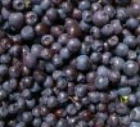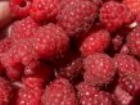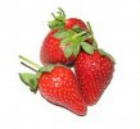Organic Berries
Probably the best thing about eating organic berries, such as organic blueberries, organic raspberries and organic strawberries, is that they not only taste great but they're very good for you too. Like
organic nuts they provide a wide array of nutrients.
When berries, as with most fruits and vegetables, are processed or over cooked their nutritional value is diminished. It is always best, when ever possible, to eat organic berries fresh and raw although freezing berries does not take away from their nutritional value.
The June 2004 issue of the Journal of Agricultural and Food Chemistry contained a report from the USDA in conjunction with the National Institutes of Health on antioxidants.
Their findings showed that processing (cooking) can have a significant negative effect of the nutritional value of the foods tested. If organic berries are used in cooking or baking they will lose most of their nutritional value.
As part of their report, they also listed 20 foods common to the American diet based on their total antioxidant content. It's interesting to note that three berries are in the top 10 with strawberries coming in at 11.
Organic Berries Rank High in The Top 20 Antioxidant Foods
Small Red Beans (aka Mexican Red Beans)
Blueberries (Wild)
Kidney Beans (Red)
Pinto Beans
Blueberries (Cultivated)
Cranberries
Artichokes
Blackberries
Prunes
Raspberries
Strawberries
Red Delicious and Granny Smith Apples
Pecans
Sweet Cherries
Black Plums
Russet Potato
Black Beans
Plums
Gala Apple
Walnuts
Serving size:
1 ounce nuts
1 cup berries
1 cup artichoke hears
½ cup beans (uncooked)
1 piece of fruit or potato

Organic Blueberries
Organic blueberries are one of the most powerful antioxidant rich fruits because they contain significant levels of flavonoids found in their anthocyanins pigments, which gives them their color.
One interesting point in the study referenced above is that they found that Wild Blueberries contain approximately 48% more antioxidants than the cultivated (farm grown) varieties.
Organic blueberries contain high levels of flavonoids which gives them their antioxidant properties. Flavonoids trigger the production of natural enzymes in the body which fight many types of disease.
It's common knowledge that antioxidants help to protect us against cancer. However, most folks don't know that they also help protect against strokes, heart disease and in preventing urinary tract infections.
Possibly the most promising recent finds is that blueberries also contain ingredients which help ward of the effects of aging especially in the area of brain function.
In June 2008 the University of Reading in England, one of the top research universities in the world, reported on their study of the medical benefits of blueberries. They found that blueberries increase memory capacity. Their finds also indicate that blueberries may help to reverse the effects of cognitive impairment and Alzheimer's disease.
The approximate percentage of the recommended daily values for the nutrients in one cup, 144 grams, of organic blueberries is – vitamin C 33%, manganese 20%, dietary fiber 15% and vitamin E 8%.

Organic Raspberries
Organic raspberries contain cancer fighting phyto-chemicals, ferulic acid, coumaric acid and ellagitannins they are also rich in anthocyanin pigments. The fiber in organic raspberries is, to some degree, soluble fiber in the form of pectin, which works to lower cholesterol.
The approximate percentage of the recommended daily values for the nutrients in one cup, 124 grams, of organic raspberries is – manganese 62%, vitamin C 51%, dietary fiber 33% with folate, vitamin B2, magnesium, vitamin B3, potassium, omega 3 and copper each registering from 5 to 10%.

Organic Strawberries
Organic strawberries offer more vitamin C than any other berry, and provide significant amounts of fiber, potassium, and manganese. Organic strawberries contain the red anthocynanin pigments and ellagic acid which are strong antioxidants.
The approximate percentage of the recommended daily values for the nutrients in one cup, 143 grams, of organic strawberries is – vitamin C 136%, manganese 20%, dietary fiber 12% with iodine, potassium, folate, vitamin B2, vitamin B5 omega 3, vitamin B6, vitamin K, magnesium and copper each registering from 5 to 10%.
Non-organic raspberries and strawberries are listed as being in the 12 most contaminated fruits and vegetables when grown using chemical pesticides, chemical herbicides and synthetic fertilizers.
It only makes sense when we have a choice to go with organic berries.
Return from our Organic Berries page to our Organic Food page
Retrun from our Organic Berries page to the Organic Living Home Page